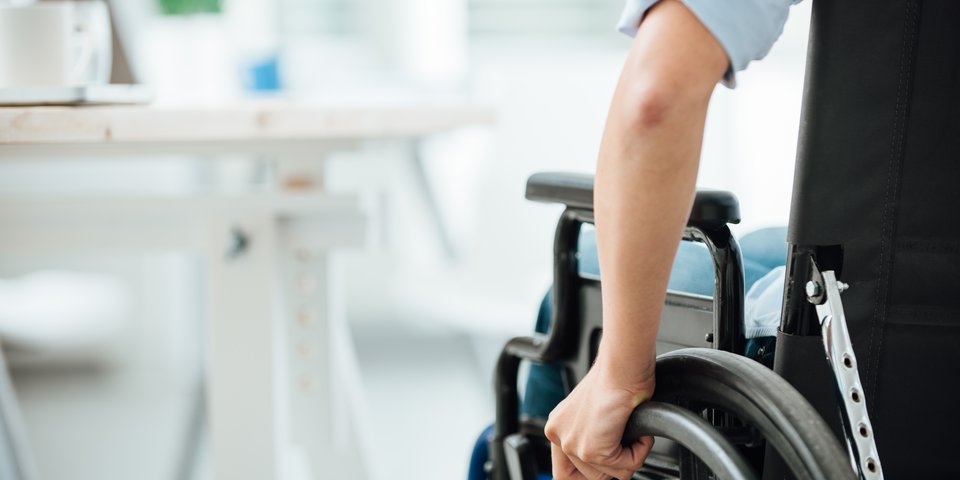 iStockphoto/demaerre
iStockphoto/demaerreMultiple discrimination: women and girls with disabilities
European Economic and Social Committee (EESC) calls for more support for women and girls with disabilities.
SW – 08/2018
The situation of women with disabilities is not only worse than that of women without disabilities, but also worse than that of their male peers. Women and girls with disabilities continue to face multiple discrimination on the grounds of gender and disability (see article Sep 2017). About 40 million women and girls throughout Europe are affected by this discrimination. This equates to 16% of the total female population. For example, the employment rate for women with disabilities is only 18.8%, whereas for men with disabilities it is 28.1%.
Current legal framework
Both the EU and the Member States lack a solid legal framework to protect and guarantee the human rights of all women and girls with disabilities, even though the EU and its Member States are signatories to the UN Convention on the Rights of Persons with Disabilities.
Article 6 of the Convention acknowledges that women and girls with disabilities are subject to multiple discrimination and, in this regard, measures should be put in place to ensure that they can enjoy full and equal human rights and fundamental freedoms.
Further provisions make it obligatory for the EU and its Member States to fight discrimination against women with disabilities. For example, all EU Member States are parties to the United Nations Convention on the Elimination of All Forms of Discrimination against Women, which should also benefit women and girls with disabilities.
In addition, Article 10 of the Treaty on the Functioning of the European Union (TFEU) requires the EU to aim to combat discrimination based on sex or disability in defining and implementing its policies and activities. Article 21 of the EU Charter of Fundamental Rights (Charter) prohibits discrimination on the grounds of disability. Article 26 of the Charter states that the EU and its Member States recognise the right of persons with disabilities to benefit from measures to ensure their independence, social and occupational integration and participation in the life of the community.
EESC recommendations
In an EESC Opinion on ‘The situation of women with disabilities’ (SOC/579) from 11 July 2018, the Committee calls for the EU and its Member States to more actively combat discrimination against women and girls with disabilities.
The EU and its Member States are called upon to implement the UN Convention on the Rights of Persons with Disabilities (UNCRPD), the recommendations that the EU received from the UNCRPD Committee with regard to women and girls with disabilities in 2015, and the UN Committee’s General Comment No.3 on Article 6 of the UNCRPD.
The EESC believes that action should be taken to establish a structured dialogue at both EU and national level. This should have a separate budget with sufficient funds and ensure meaningful consultation with and participation by persons with disabilities, including women and girls with disabilities, through their representative organisations when implementing and monitoring the UNCRPD.
The EU’s current and future funding instruments, in particular the Structural Funds and the European Social Fund, should also be used to help Member States in promoting accessibility and non-discrimination with regard to women and girls with disabilities.
The EU and its Member States are also called upon to accede to the Council of Europe Convention on Preventing and Combating Violence against Women and Domestic Violence (Istanbul Convention) as part of combating violence against women and girls with disabilities. Sexual and other violence against women and girls with disabilities should be criminalised and compulsory sterilisation should be ended.
Furthermore, the EU and its Member States should take all measures necessary to ensure that women and girls with disabilities have equal access to healthcare and to accessible mainstream health services. Women and girls with disabilities must be able to exercise their legal capacity to make their own decisions, with support if desired, regarding medical treatment.
Next steps
In its Opinion, the EESC recommends that the EU and its Member States develop a comprehensive campaign to raise awareness of the UN Convention on the Rights of Persons with Disabilities and the UN Convention on the Rights of Women, to raise awareness of women with disabilities and to combat prejudice against women and girls with disabilities.
The Opinion was prepared at the request of the European Parliament and will feed into the report on women with disabilities to be adopted by the European Parliament this autumn.
The EESC article can be read here.
